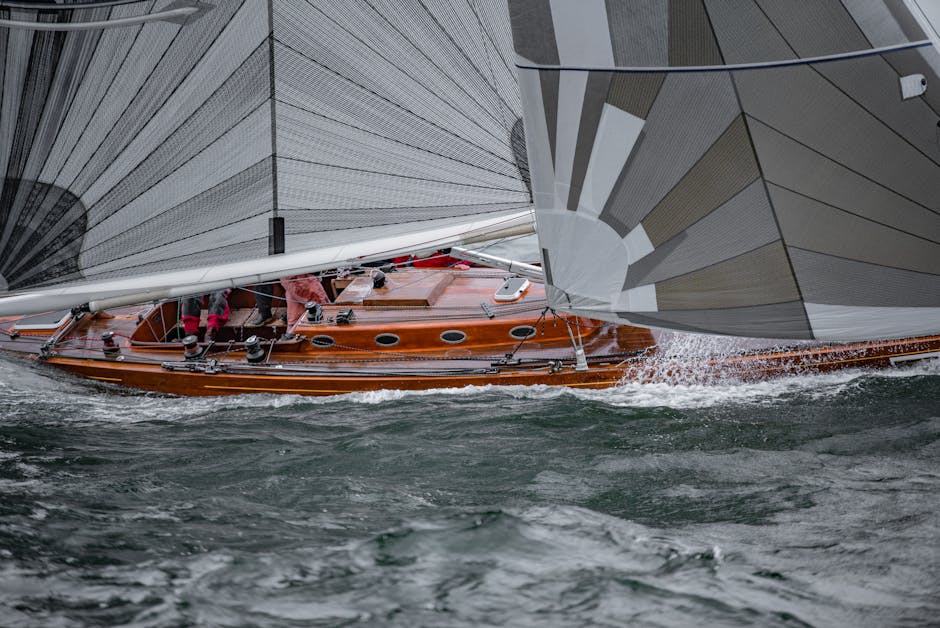Blog Content
Protecting Your Maritime Heritage: Understanding Antique Boat Insurance
Antique boat insurance is specialized coverage designed specifically for historic, vintage, and classic vessels that provides agreed value protection, restoration coverage, and liability protection custom to older boats. Unlike standard boat policies, antique boat insurance accounts for the unique value, repair needs, and usage patterns of collector vessels.
Quick Guide to Antique Boat Insurance:
For Maine boat owners navigating the waters of Wells, Kennebunk, and beyond, insuring a classic vessel requires more than standard coverage. Many Maine homeowners are surprised to learn their existing policies typically cap boat property coverage at just $1,500 - woefully inadequate for cherished wooden Chris-Crafts or vintage Lyman runabouts that grace our coastal waters.
"Over 35 years ago, when Frank and Louise couldn't find coverage for their beloved boats, they created the first ever Agreed Value policy," notes one industry pioneer. This innovation transformed how antique boats are protected, ensuring full payout of an agreed-upon value rather than a depreciated amount.
Whether you're sailing a 1930s wooden sloop in Kennebunkport Harbor or cruising a classic fiberglass runabout along the Biddeford coastline, specialized antique boat insurance protects both your investment and Maine's maritime heritage.
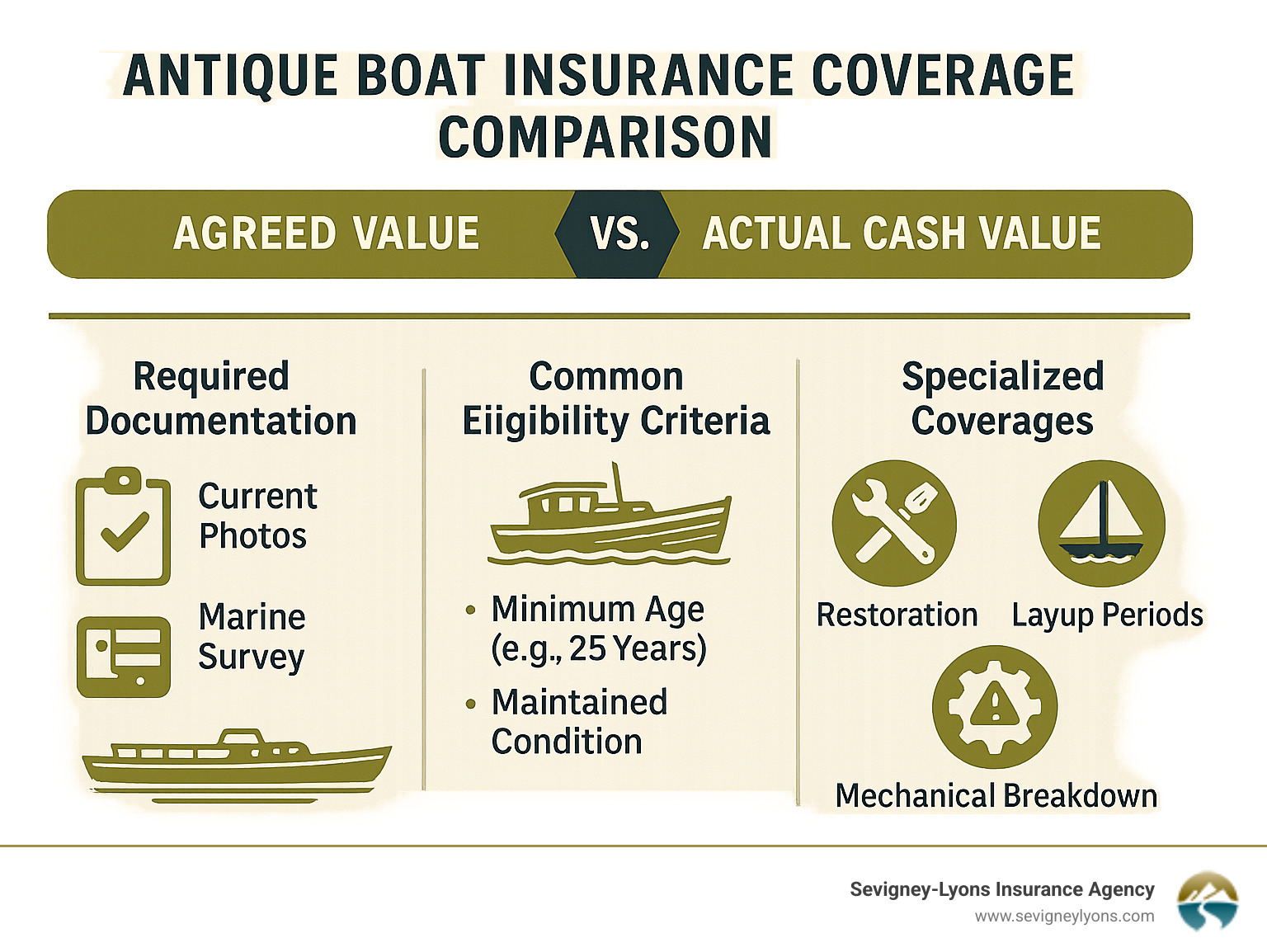
What Makes a Boat 'Antique' in Maine Waters?
Maine's coastline tells a story through its vessels—from weathered lobster boats to neat wooden runabouts. As you cruise the waters from Wells to Ogunquit, you might wonder: when does your cherished boat become more than just "old" and earn the prestigious "antique" or "classic" designation? This distinction isn't just about bragging rights at the marina—it directly impacts how you should insure your maritime treasure.
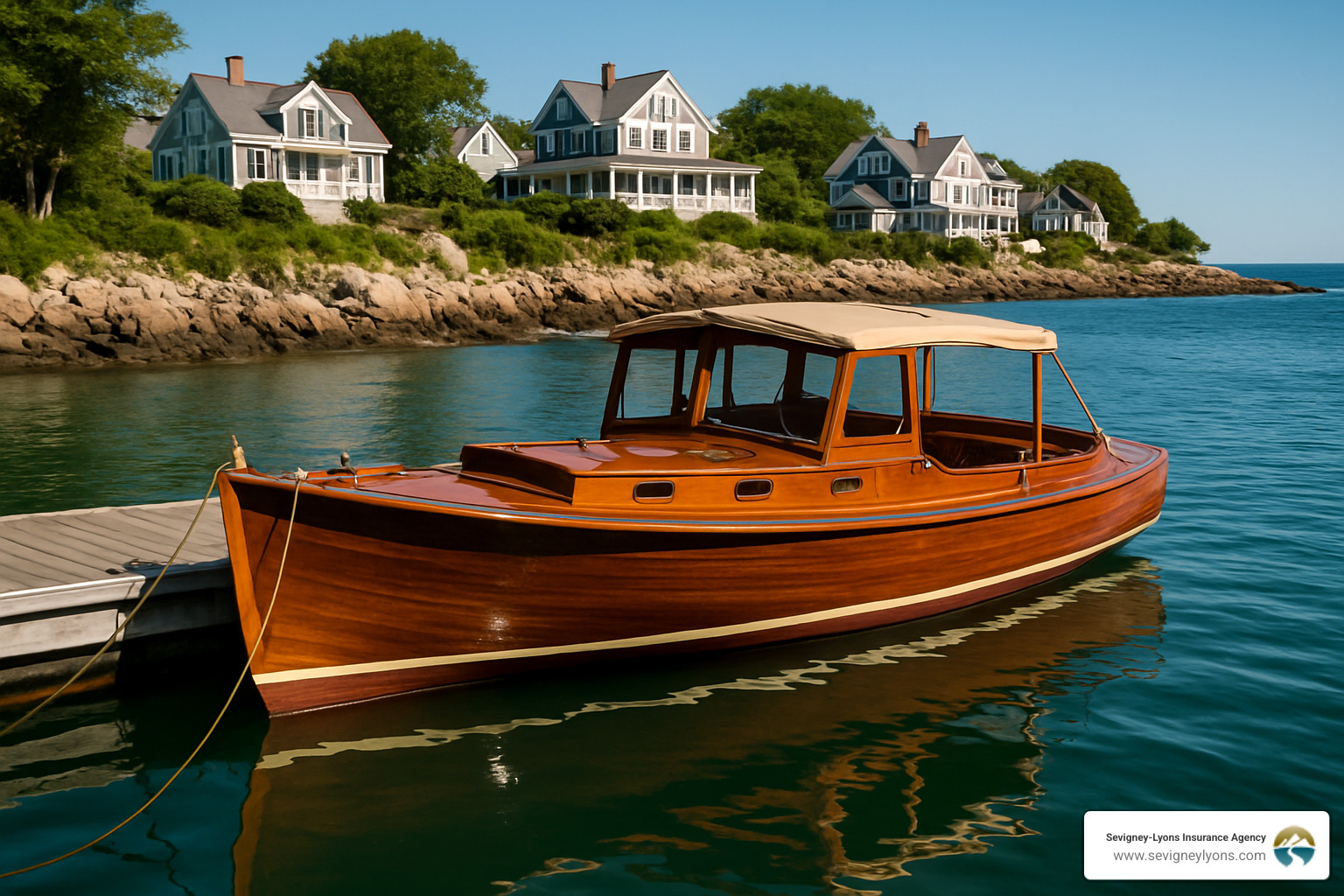
The Antique and Classic Boat Society (ACBS) has established clear categories that have become the industry standard. These classifications focus purely on age, regardless of whether your pride and joy is crafted from mahogany, cedar, or fiberglass. For more detailed information on boat classifications and judging standards, you can visit the ACBS official boat classifications page.
Age-Based Classifications Explained
When you're talking about boats with character in Kennebunk Harbor or along the Biddeford coast, age defines their historical category. Here's how they break down:
Historic Boats are the grand elders of the water, built through 1918. These rare vessels represent the earliest era of recreational boating in Maine and beyond.
Antique Boats were constructed between 1919 and 1942—think gleaming varnished hulls and the unmistakable rumble of early inboard engines. These boats capture the golden age of wooden craftsmanship that once dominated Maine's boatyards.
Classic Boats span from 1943 to 1975, including both traditional wooden vessels and the early fiberglass models that changed boating forever.
Late Classic boats were built from 1976 to 25 years before the current year. Many of these vessels represent transitional designs that combine traditional aesthetics with modern materials.
"Today's classification system focuses entirely on age rather than construction materials," explains a Maine marine insurance specialist. "This important shift recognizes that a 1960s fiberglass Whaler or Lyman deserves the same respect—and protection—as their wooden counterparts."
For Maine boat owners, these distinctions extend beyond collector conversations. The Maine Department of Inland Fisheries and Wildlife offers special registration options for genuine antique watercraft, while marinas throughout Wells and Kennebunk frequently host gatherings celebrating these floating pieces of history.
Why Age & Condition Matter to Insurers
Insurance companies view your classic Chris-Craft or vintage Boston Whaler through a different lens than they do modern boats, and for good reason:
Scarce replacement parts present a major challenge for owners of antique boats. Finding authentic hardware for a 1930s runabout often means custom fabrication at specialized shops—a process that can be surprisingly expensive.
Structural integrity concerns are unique to older vessels. Wooden boats face distinct deterioration patterns involving dry rot, fastener failure, and frame integrity that require specialized assessment.
Valuation complexity makes standard book values nearly useless. Unlike mass-produced modern boats, antique vessels derive their worth from a combination of rarity, historical significance, restoration quality, and provenance.
Specialized repair knowledge is increasingly rare. As one Kennebunk boat restorer told us, "There are fewer craftspeople every year who truly understand how to restore these treasures properly. When something goes wrong, you can't just take it to any marina."
This reality underscores why antique boat insurance differs so dramatically from standard coverage. A policy that doesn't account for these unique factors leaves Maine boat owners vulnerable to significant financial loss.
"A classic boat demands more comprehensive coverage than a typical vessel," notes a southern Maine insurance specialist. "Does your current policy lock in your agreed value so you're protected from depreciation after a total loss? Most standard policies simply don't."
For boat owners throughout Southern Maine—from Ogunquit to Biddeford and beyond—understanding these distinctions is the first step toward properly protecting your floating piece of maritime heritage.
Antique Boat Insurance Coverages & Options
Gliding across Casco Bay in a carefully restored wooden Chris-Craft isn't just boating—it's preserving a piece of Maine's maritime heritage. But when it comes to protecting these floating treasures, standard boat policies simply won't cut it. Antique boat insurance offers specialized protection custom to the unique needs of classic vessels.
Agreed Value Policies for Antique Boat Insurance
The crown jewel of proper antique boat insurance is the agreed value policy. Unlike typical boat coverage that shrinks with time, agreed value guarantees you'll receive the full, predetermined amount if disaster strikes.
"I remember when the Johnsons lost their 1952 Thompson to a dock fire in Wells Harbor," recalls a local marine insurance specialist. "Thank goodness they had an agreed value policy—they received their full $65,000 to rebuild, no questions asked."
This distinction matters tremendously for Maine boat owners. With an agreed value policy, that lovingly restored 1940s mahogany runabout you cruise around Kennebunkport will be insured for the amount you and your insurer agree upon—not some depreciated figure from a standard valuation guide.
To secure this coverage, you'll typically need to provide:
- A professional marine survey (especially for boats over 26 feet)
- Detailed photographs showing your vessel's condition
- Documentation of restoration work with receipts
- Appraisals establishing current market value
Liability & Environmental Protections
Beyond protecting your wooden treasure itself, comprehensive antique boat insurance shields you from potentially devastating liability claims.
Third-party liability coverage protects you if someone is injured aboard your vessel or if you accidentally damage another boat while navigating the busy summer waters off Ogunquit Beach.
Fuel spill liability is particularly crucial for antique boats with older fuel systems. Maine's environmental regulations are strict, and cleanup costs for even a small spill in our pristine waters can be astronomical.
Wreck removal coverage might seem like an afterthought until you need it. If your classic boat sinks in a navigable channel, harbor authorities will require its prompt removal—at your expense. This coverage ensures you won't face those potentially massive costs alone.
Uninsured boater protection rounds out your safety net, covering medical expenses if you're injured by another boater who lacks proper insurance—unfortunately all too common on busy summer weekends along Maine's coast.
Restoration & Lay-Up Coverage
One of the unique aspects of antique boat insurance is protection during those long Maine winters and restoration periods.
"My 1938 Lyman was covered even while being restored at that little boatyard in Biddeford," shares one satisfied boat owner. "When a fire damaged the shop last winter, my boat was fully protected—something my regular policy would never have covered."
In-shop protection ensures your vessel remains covered during professional restoration work, while seasonal storage coverage protects against winter's harsh elements. Many insurers offer valuable lay-up discounts during Maine's off-season months, reducing premiums while maintaining essential protection against fire, theft, and storms.
Dockside risk coverage is another vital feature, protecting your classic beauty while moored at your dock from unexpected hazards like falling trees during those notorious nor'easters that sweep through our coastal communities.
For Maine's dedicated classic boat enthusiasts, these specialized coverages aren't luxury extras—they're essential protections for irreplaceable maritime treasures that deserve proper safeguarding on and off the water.
Cost & Eligibility Factors for Wells, Kennebunk & Beyond
The cost of antique boat insurance varies widely based on numerous factors specific to your vessel and how you use it in Maine waters. Understanding these factors can help you secure appropriate coverage at a reasonable premium.
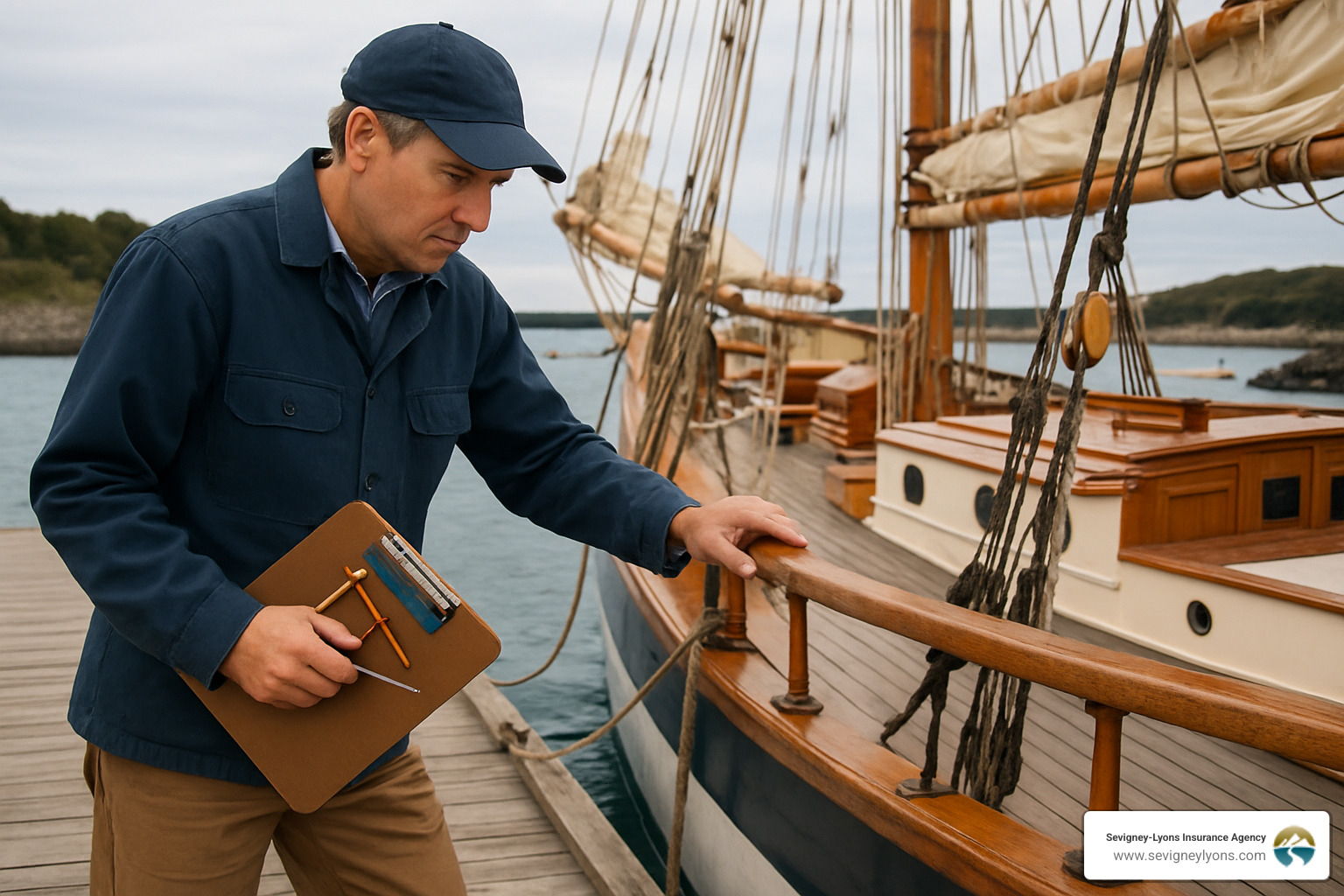
What Affects Antique Boat Insurance Quotes?
When you're cruising the waters around Wells or mooring in Kennebunk Harbor, it's comforting to know your vintage vessel is properly protected. But what determines your premium costs?
Your boat's age and value play a significant role, though perhaps not in the way you might expect. As one seasoned Maine provider told me with a wink, "Classic boats may actually cost less to insure than newer boats—unless they're rare collectibles that make collectors drool."
The hull material matters tremendously here in Maine, where our harsh winters test every vessel. Wooden boats typically command higher premiums than fiberglass counterparts due to their ongoing maintenance needs and potential deterioration issues. That beautiful mahogany Chris-Craft might turn heads in Ogunquit Harbor, but insurance companies see maintenance costs.
How you enjoy your boat—your usage patterns—significantly impacts your premium. Many Maine boat owners benefit from our shorter season with reduced rates. If you're only taking that vintage Thompson out on Saturdays during July and August, you'll likely pay less than someone cruising from May through October. Most policies specify maximum days on water, geographic boundaries (particularly important along our diverse Maine coastline), and often speed limitations—many classic policies won't cover boats that exceed 45 mph.
Your personal boating experience matters too. Have you taken safety courses? Do you have a clean claims record? These factors can substantially reduce your premium costs for antique vessels.
Where you store your boat when it's not creating memories on the water affects your rates as well. A classic runabout kept in a secure boathouse in Wells will typically cost less to insure than one bobbing on a mooring in open water where storms can roll in unexpectedly.
Don't forget to ask about membership discounts! Many insurers offer substantial savings for members of organizations like the Antique and Classic Boat Society, Chris-Craft Antique Boat Club, or Lyman Boat Owners Association. These affiliations signal to insurers that you're serious about proper maintenance and preservation.
While the average Maine boat insurance costs approximately $400 annually, antique boat insurance premiums typically range from $300 to over $1,000 depending on these variables. For boat owners in coastal communities like Kennebunk and Biddeford, shopping around with a knowledgeable local agent can make a significant difference.
Eligibility Checklist for Maine Owners
Not every vintage vessel automatically qualifies for specialized coverage. Before you start dreaming about cruising Biddeford Pool in your newly acquired classic, understand what insurers are looking for.
First and foremost, your boat must be in good to excellent condition. That "project boat" sitting on blocks in your yard probably won't qualify until restoration is substantially complete. Insurers want to see vessels that are well-maintained with no significant structural issues threatening their seaworthiness.
For larger classics, particularly those over 26 feet, expect to need a professional survey. As one Maine marine surveyor told me while inspecting a classic sailing yacht in Portland Harbor, "Sailboats over 26 feet almost always require an out-of-water survey to identify any hidden issues below the waterline." This requirement is particularly relevant for owners of classic sailboats in Portland Harbor or Casco Bay.
Most specialized programs have minimum hull values—typically between $10,000-$20,000—to qualify for coverage. This reflects the reality that truly collectible boats represent significant investments worth protecting properly.
Your storage arrangements matter tremendously in our Maine climate. Insurers want to see secure dockage, proper moorings, or appropriate on-trailer storage when not in use. The winter storage plan for your classic is particularly important along our coast where nor'easters can wreak havoc.
Many policies exclude high-performance classics, so that vintage speedboat might be challenging to insure. Insurers typically prefer vessels with moderate speed capabilities and predictable handling characteristics.
Pay special attention to geographic restrictions in your policy. Some restrict coverage to inland waters or limit coastal navigation to specific distances offshore—a crucial consideration if you're planning to island-hop along Maine's spectacular coastline. A policy might cover you perfectly on Sebago Lake but leave you exposed if you venture past the Kennebunk River mouth into the Atlantic.
For Maine boat owners navigating these complex waters of insurance eligibility, working with a local independent agent who understands both boating and insurance can make all the difference. Their expertise helps ensure your maritime treasure receives the protection it deserves at a price that keeps you smiling from Wells to Biddeford and beyond.
How to Secure the Right Policy & File Claims
Navigating the waters of antique boat insurance requires expertise and local knowledge—particularly in Maine's diverse boating environments. From the rocky outcroppings of Ogunquit to the busy harbor of Kennebunkport, finding the right coverage means working with professionals who understand both insurance and Maine's unique maritime landscape.

Working with a Maine Marine Insurance Broker
At Sevigney-Lyons Insurance Agency, we've been helping Maine boat owners protect their maritime treasures for generations. Our roots run as deep as the tides in Southern Maine, giving us unique advantages when it comes to insuring your classic vessel:
We understand the difference between navigating the protected Kennebunk River and venturing into the open waters off Biddeford Pool. That local expertise matters when crafting a policy that truly protects your investment.
As an independent Maine insurance agency, we're not tied to a single insurance company. Instead, we can shop among our relationships with over 20 top carriers to find coverage that fits your boat like a custom-custom sailing glove. As one client told us, "Having someone compare options for my Chris-Craft saved me money and improved my coverage."
We take the time to get to know you and your boat personally. Whether you're restoring a wooden sailboat in Wells or maintaining a classic fiberglass runabout in Ogunquit, we'll recommend protection that matches your specific needs. As marine insurance specialists often note, "Independent agents, not direct writers, offer true advocacy and customized solutions."
Preparing Your Documentation & Surveys
Securing the right antique boat insurance policy is a bit like preparing for a regatta—proper preparation makes all the difference. Before you apply for coverage, gather these essential items:
A professional marine survey is the foundation of your insurance application, especially for boats over 26 feet. This comprehensive inspection, typically required every 3-5 years, gives insurers confidence in your vessel's condition and value.
Clear, detailed photographs tell the story of your boat. Capture images of everything from the gleaming hull and varnished brightwork to the engine compartment and electronics. Maine's dramatic light makes for beautiful boat photos, but make sure they clearly document your vessel's condition.
Your maintenance records and restoration documentation demonstrate your commitment to preserving your maritime heritage. That folder of receipts for bottom paint, varnish work, and engine maintenance isn't just for tax purposes—it helps secure better insurance terms.
Supporting documentation for your boat's value gives insurers confidence in providing agreed value coverage. Whether it's an appraisal, comparable sales data, or detailed restoration receipts, this information helps establish the proper insured value.
Information about your typical cruising patterns helps tailor coverage to your needs. Do you stick to day sailing in Wells Harbor, or do you venture up the coast to Portland on summer weekends? These details matter.
As one experienced Maine boat restorer put it, "The more documentation you provide upfront, the smoother your insurance experience will be—both when applying and if you ever need to file a claim."
The Antique Boat Insurance Claims Process
Even the most careful captains sometimes encounter rough seas. If you need to file a claim on your antique boat insurance policy, here's what to expect:
Contact your provider immediately. In Maine's boating community, word travels fast after a storm or marina incident, but don't rely on the dockside telegraph—report your loss directly to your insurance company as soon as possible.
Document everything thoroughly. Take photos of the damage, gather witness information, and write down your recollection of events while they're fresh. As the saying goes around Kennebunk Marina, "The boat owner with the best documentation gets the smoothest claim."
For significant damage, expect a professional assessment. An adjuster or marine surveyor will examine your vessel, often at your marina or boatyard. Their expertise helps ensure appropriate repairs for your antique craft.
One of the most valuable features of quality antique boat insurance is the ability to choose your repair facility. This is crucial for vintage vessels that require specialized knowledge. That fifth-generation boatbuilder in Biddeford might be the only person you trust with your 1938 runabout—and a good policy respects that choice.
For total losses under agreed value policies, you'll receive your full insured amount, minus any deductible. Unlike standard policies that depreciate your vessel's value, this approach acknowledges the true worth of your maritime treasure.
Some specialized policies even offer "Cherished Salvage®" options, allowing you to keep your boat after a total loss payout. For many Maine families whose boats carry generations of memories, this feature is priceless.
As you steer the waters from Wells to Ogunquit and beyond, having the right insurance partner makes all the difference. At Sevigney-Lyons Insurance Agency, we're proud to help preserve Maine's maritime heritage, one beautiful antique boat at a time. More info about waterfront coverage
Frequently Asked Questions about Antique Boat Insurance in Maine
Do antique & classic boats cost more to insure than new models?
Here's a pleasant surprise for many classic boat owners – your cherished wooden Chris-Craft or vintage Lyman might actually cost less to insure than a brand-new vessel.
Antique boat insurance premiums often run comparable to—or even lower than—coverage for newer boats of similar size. This happens for several good reasons: classic boats typically spend less time on the water during Maine's brief boating season, owners tend to be experienced boaters who take meticulous care of their vessels, and many older boats cruise at more modest speeds than modern watercraft.
"Most of our Wells and Kennebunk clients are pleasantly surprised when they see their quotes," notes one local marine insurance specialist. "Their lovingly maintained 1950s runabout often costs less to insure than their neighbor's brand-new speedboat."
That said, if you're fortunate enough to own a rare or extremely valuable antique boat, you might face higher premiums simply because these vessels are irreplaceable and require specialized restoration expertise when damaged.
What documents will I need to get antique boat insurance?
When you're ready to protect your maritime treasure with proper antique boat insurance, having your paperwork organized makes the process smooth sailing. Most Maine insurers will ask for your vessel's registration or documentation, but that's just the beginning.
For boats over 26 feet or those with significant value, you'll need a professional marine survey that thoroughly assesses your vessel's condition and establishes its market value. This becomes your baseline for agreed value coverage.
Clear, comprehensive photographs showing your boat from all angles – including the hull, interior, engine compartment, and any special features or restoration work – help underwriters understand exactly what they're covering. These images, along with purchase receipts or professional appraisals, support your requested insured value.
Be prepared to share details about your boating experience, any certifications you hold, and information about where and how you store your vessel both during Maine's short summer season and our challenging winters. For wooden boats particularly common in harbors from Ogunquit to Biddeford, insurers often want to know about your maintenance schedule and winter storage practices.
Are there navigational limits for my antique boat along the Maine coast?
Maine's rugged coastline offers incredible cruising opportunities, but your antique boat insurance policy may not cover every nautical trip you dream up. Most policies include specific navigational boundaries that deserve careful attention.
Typical coastal navigation limits restrict coverage to within 50-100 nautical miles offshore – usually sufficient for most Maine boating, but potentially problematic if you're planning that bucket-list cruise to Nova Scotia in your classic sailboat. Seasonal restrictions are particularly relevant in Maine, with many policies limiting or excluding coverage during our harsh winter months (typically November through April).
"We always ask our clients about their cruising habits," explains one Southern Maine insurance professional. "If you keep your antique runabout in Wells Harbor but occasionally trailer it to Moosehead Lake, we need to make sure your policy covers both coastal and inland waters."
Some policies also contain geographic exclusions for high-risk areas or require notification before venturing into certain waters. For Maine boaters who enjoy exploring from Casco Bay to Penobscot Bay and beyond, these details matter tremendously.
At Sevigney-Lyons Insurance Agency, we help steer these restrictions to ensure your classic vessel has appropriate coverage wherever your maritime trips take you along Maine's magnificent coast.
Preserving Maine's Maritime Heritage Through Proper Protection
Maine's waters have been home to beautiful wooden boats for generations, from the working lobster boats of Wells Harbor to the neat sailing yachts of Kennebunkport. Proper antique boat insurance does more than protect an investment—it helps preserve our state's rich maritime heritage.
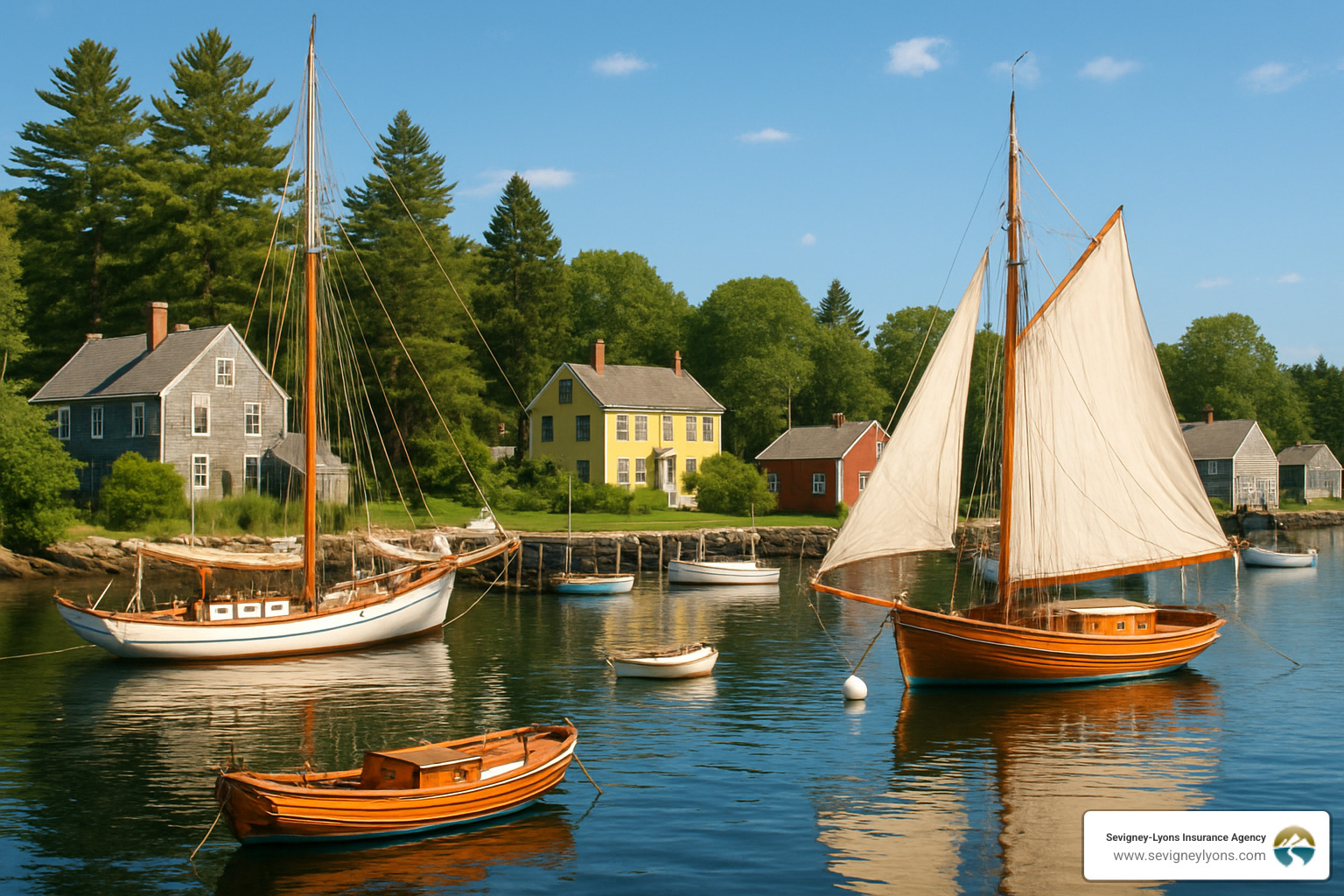
There's something special about the gleam of varnished mahogany catching the late afternoon sun as it reflects off the Kennebunk River. These floating treasures connect us to our past in ways few other possessions can. That's why protecting them requires more than just any insurance policy.
For owners of antique and classic boats in Southern Maine, the specialized knowledge of a local, independent insurance agency provides invaluable protection. At Sevigney-Lyons Insurance Agency, we understand the unique challenges of insuring classic vessels in our local waters. We've seen how the salt spray in Ogunquit affects wooden hulls differently than the freshwater conditions inland.
With access to over 20 top carriers and decades of experience serving the communities of Wells, Ogunquit, Kennebunk, Biddeford, and beyond, we tailor coverage to each vessel's unique characteristics and usage patterns. We know that a 1950s Chris-Craft used for afternoon cruises in Wells Harbor has different insurance needs than a restored lobster boat that occasionally ventures to offshore islands.
When it comes to protecting your maritime heritage, remember these essential points:
Verify Classification – Understanding whether your vessel qualifies as historic, antique, classic, or late classic isn't just about terminology; it directly impacts the type of coverage you need and can qualify for.
Insist on Agreed Value – Maine's weather can be unpredictable, and standard actual cash value policies simply don't provide adequate protection for these irreplaceable vessels. An agreed value policy ensures you'll receive the full insured amount if the worst happens.
Document Thoroughly – Those photos you took of your restoration project aren't just for sharing with fellow enthusiasts; they're valuable documentation that supports both your initial coverage application and any potential claims down the road.
Understand Limitations – The waters off Biddeford Pool present different challenges than the protected harbors of Kennebunkport. Be crystal clear about navigational limits, seasonal restrictions, and usage requirements specific to Maine waters before you set sail.
Work with Local Experts – There's no substitute for an insurance partner who understands both Maine's maritime environment and the specialized needs of classic vessels. We've helped countless boat owners steer these waters successfully.
Whether you're restoring a 1940s wooden Chris-Craft in your Biddeford garage or sailing a classic Hinckley along the Maine coast, proper antique boat insurance provides the peace of mind to enjoy Maine's waters while preserving these floating treasures for future generations.
For more information about specialized coverage for your antique boat or to request a personalized quote, contact Sevigney-Lyons Insurance Agency today. Our team of marine insurance specialists is ready to help you steer the waters of Maine antique boat insurance with confidence—because your boat isn't just a vessel, it's part of Maine's living maritime history.

